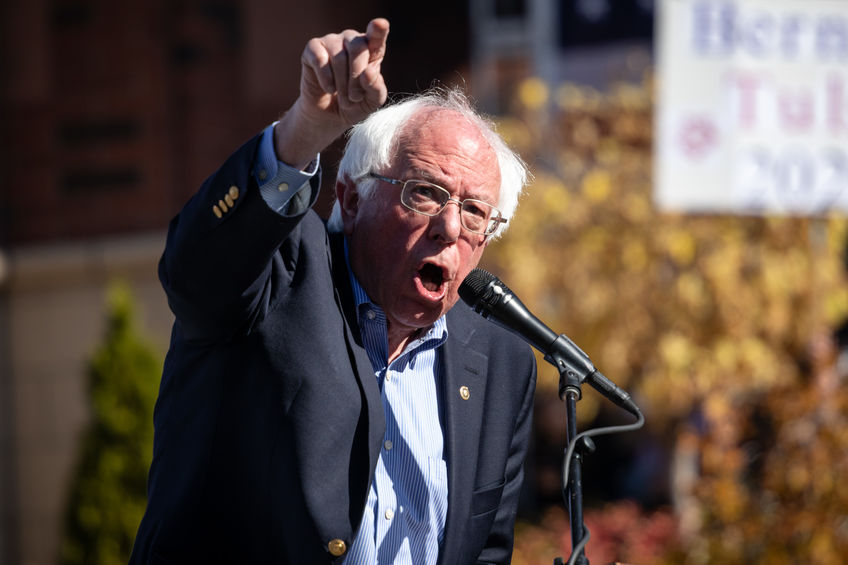Forgiving the Unforgivable: Democrats Propose Wide Range of Solutions for Student Debt
 To forgive or not to forgive? That is the question as Democratic presidential candidate hopefuls line up to state whether or not they are still repaying their student loans (and if this repayment reaches six figures) and what their intentions for the student loan crisis are, leading to the $1.6 trillion debt becoming one of the central issues of this race.
To forgive or not to forgive? That is the question as Democratic presidential candidate hopefuls line up to state whether or not they are still repaying their student loans (and if this repayment reaches six figures) and what their intentions for the student loan crisis are, leading to the $1.6 trillion debt becoming one of the central issues of this race.
With calls coming forward from all corners of the Democratic Party, voters are seeing a wide range of options for how to tackle what has been hailed as the potential cause of the next financial crash, the only thing is, not everyone is clear about how they intend to pay for it.
Last week Bernie Sanders surprised many with his calls to forgive all student debt. Prior to this, Elizabeth Warren announced that she planned to cancel debt “for more than 95%” of those burdened with loan debt. And while these candidates have led the charge of progressive arguments for how to deal with the debt crisis, the popularity of their proposed policies has baited other Democrats to follow suit.
 Joe Biden, who remains the frontrunner despite criticisms of his performance in the first debate, has said that he wants to forgive teachers’ student loans. South Bend Mayor Pete Buttigieg wants to solve the problem by offering free college to those coming from lower-income and middle-class backgrounds, saying in the debate that he does not “believe it makes sense to ask working-class families to subsidize even the children of billionaires.” Robert O’Rourke has suggested cancelling the debt of those who work in fields or areas where there is a low supply of labor. Kamala Harris has called for debtless tuition and lower interest rates on existing loans. And Eric Swalwell, the Californian congressman, has proposed forgiving debt in exchange for engaging in work-study programs and community service while at college.
Joe Biden, who remains the frontrunner despite criticisms of his performance in the first debate, has said that he wants to forgive teachers’ student loans. South Bend Mayor Pete Buttigieg wants to solve the problem by offering free college to those coming from lower-income and middle-class backgrounds, saying in the debate that he does not “believe it makes sense to ask working-class families to subsidize even the children of billionaires.” Robert O’Rourke has suggested cancelling the debt of those who work in fields or areas where there is a low supply of labor. Kamala Harris has called for debtless tuition and lower interest rates on existing loans. And Eric Swalwell, the Californian congressman, has proposed forgiving debt in exchange for engaging in work-study programs and community service while at college.
The means by which each of these proposals will be paid for has varied from candidate to candidate, with some offering detailed plans, and others, verbal assurances. Both Warren and Sanders have published how they will raise funds for their strategies, with the former stating that she will impose a 2% tax on Americans with $50 million or more in wealth, and the latter proposing a tax on Wall Street speculators that he claims will raise $2.4 trillion over a ten-year period. Meanwhile, other candidates have yet to clarify how their solutions will be financed; and these announcements are being made just as the Congressional Budget Office’s most recent evaluation of the 2017 Republican-backed tax cut has estimated the net cost of the cuts to come to $1.9 trillion – $3 trillion more than the total sum of student debt.
The conversation generated from these announcements has spilled out beyond debates and candidate interviews, as non-political figures such as Mark Cuban, Jamie Dimon, and Gary Vaynerchuk have each contributed their two cents. The last of these has explained that he sees the next generation of Americans as the ones who will “walk away” from colleges as they are known now; Dimon has gone on record in his annual letter to JPMorgan Chase shareholders to call the crisis a “disgrace” that is “hurting America”; and Cuban has partnered with ChangEd, a program that seeks to assist students in paying off their debts, as part of an event to help high school and college students learn more about their future finances.
Interactions like these, between popular figures and the hot topic that student debt has become, are increasing in frequency, and as the Democratic primaries run on it is likely this trend will continue. However, it is too early to say which side of Dems will win, pro-forgiveness or a lighter, less dramatic form of relief for students.
With reports indicating the extent to which student loans affect the 45 million indebted Americans who took them out, it appears that this will be one of the major issues to shape the primary and presidential races. Stories of graduates sacrificing opportunities to marry, have children, buy a home, and even continue careers in the fields they studied beg the question of what exactly the benefit of college is. The next year will demonstrate whether Democrats are able to drum up an answer.
Last modified: July 1, 2019Brendan Garrett was a Reporter at deBanked.































